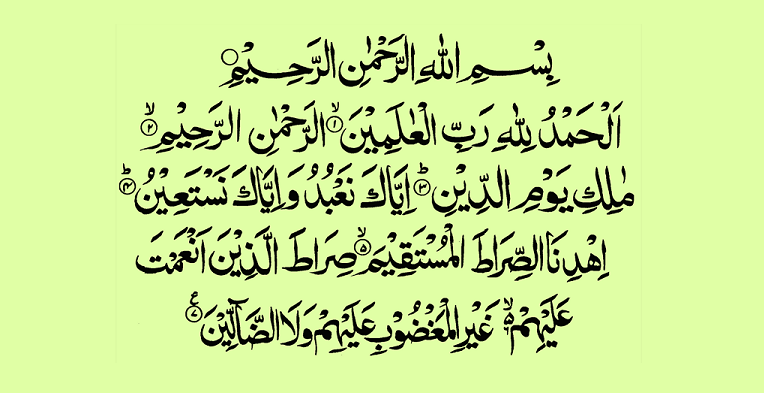By Shaykh Yūsuf Badāt
Practicing Muslims generally pray five times a day. The Al-Fātiḥah is the first chapter of the Qurʿān which is an integral component of the daily ritual prayers. Here is the verbatim literal English translation of the supplication with no interpretation, brackets, explanation or footnotes:
“In the name of God, the Beneficent, the Merciful.
Praise be to God, Lord of the worlds,
The Beneficent, the Merciful.
Owner of the day of judgment,
We only worship You and only seek help from You.
Show us the straight path,
The path of those whom You have favoured;
Not of those who earn Your anger nor of those who go astray.” (Qurʿān 1:1-7)
Anything questionable in the above prayer? Well there seems to be a handful of anti-Muslim elements calling the above prayer a daily Muslim curse of hate against our brothers and sisters of the Jewish and Christian faith.
Status of the Jews and Christians in Islam
Allow me to then give you a glimpse into Islam’s position of honour and respect for Jews and Christians.
The Qurʿān addresses many segments of humanity. When God addresses the Jews and Christians in the Qurʿān, He addresses them with a special title. That title is, “The People of the Book” indicative of the respect they have due to receiving God’s revealed Gospels and Testaments.
God, in the Qurʿān permits Muslims to consume the meats blessed by Jews and Christians (See: 5:5). If Muslims were to hate and curse Jews and Christians, why would the Qurʿān allow this?
God also allows Muslims (with some conditions) to wed and marry Jews and Christians. (See: 5:5)
Islam’s icon, Muḥammad (peace and blessings upon him) had married a noble Jewish lady, Ṣaffiyah Bint Ḥuyyayy. Her linage traces back to Moses’s brother, Aron.
The Prophet of Islam, Muḥammad, also accepted food that was gifted to him from the Jewish woman, Zaynab bint AlḤārith. (See: Abū Dāwūd)
A young Jewish lad, named ‘Abd al Quddūs’ insisted that he wanted to join his fellow young friends in assisting Muḥammad. Muḥammad welcomed this Jewish youngster’s presence and treated him with utmost respect. At the young lad’s death bed, Muḥammad visited him in his home and showed extraordinary respect to his Jewish family. Again, this is a testimony to the kindness of Islam’s Prophet to the Jew. (See: Bukhārī)
There are countless reports of the Prophet Muḥammad signing peace treaties, cooperating and conducting financial transactions and business and trade with both the Jews and Christians.
In the later years of Muḥammad’s life in Madīnah, he held one of the greatest interfaith events in his mosque with the Christians of Najrān. This was a delegation of 60 high profile Christian leaders. They were hosted by the Prophet Muḥammad. He allowed this Christian group to pray their Christian prayers in his mosque. (See: Al Bidāyah Wal Nihāyah)
The famous story of Caliph ‘Omar bin Khaṭṭāb is well known. When he was given a stately tour of the blessed city of Jerusalem by the Patriarch, Sophronius, they entered the Church of the Holy Sepulchre when the time for Omar’s prayer had set in. Sophronius invited Omar bin Khaṭṭāb to pray inside the Church but ‘Omar bin Khaṭṭāb declined. He insisted that if he prayed there, later Muslims would use it as an excuse to convert it into a mosque thereby depriving Christianity of one its holiest sites. Instead ‘Omar bin Khaṭṭāb prayed outside the Church, where a mosque was later built, in his name.
All of the above just simply tells the average Muslim that Jews and Christians are held in great respect by Muslims.
So What is Meant By “Those Who Earn God’s Anger and Those Who Go Astray”?
General Meaning in a Literal Sense
In a literal sense there is no explanation required. This prayer is a general supplication to be guided and also to be protected from God’s wrath and from being astray. Just stick to the literal verbatim direct meaning. No questions asked!
The Path of Moses, Jesus and Muḥammad
The verses “Not of those who earn Your anger nor of those who go astray” are a continuation of the verses before them which state “We seek the path of those whom you have favoured”. The Qurʿān clarifies for its readers that the “favoured ones” are also all the 124 000 prophets of God, which include both Moses and Jesus (See Qurʿān: 4:69). Hence this Al-Fātiḥah supplication is a prayer to seek the path of Moses, Jesus and Muḥammad. Therefore, how can this be a curse against Jews and Christians?
Knowledge with Practice and Practice with Knowledge
All the classical and contemporary Islamic theological interpretations clarify that “those who earn God’s anger” are those who had knowledge but failed to act on their knowledge. As for “those who went astray” refers to those who practiced but without knowledge or education (See: Zamakhsharī). Hence, we establish that, according to this interpretation, this supplication is for being amongst the people of guidance with both education and action.
A Segment of Past Jews and Christians That Came Before Muḥammad
There is no doubt some of the interpretations including prophetic reports (ḥadiths) suggest that there were people of religions in the past who failed to uphold the required criteria laid down by God in the previous divine scriptures. Some of these people were a segment (the word ‘segment’ is emphasized here) of the past Jews and Christians. Not all Jews or Christians. Every religion, group or community has their fair share of bad apples. Be it Muslim, Jew, Christian, Hindu, Buddhist or Sikh etc.
Every Jew and every Christian is not referred to in the said prayer, even if this interpretation is considered. It is for this reason the Qurʿān clearly describes the Jews and Christians as balanced and upright people in faith. (See Qurʿān: 2:62, 5:66, 3:113).
In addition, in case you didn’t know, a Muslim cannot be regarded as a true Muslim without belief in Moses and Jesus. Hence how can a true Muslim curse faith communities, whose leaders, Moses and Jesus, are also an integral to their Islamic creed!
Conclusion
Islam teaches mercy and love. We may disagree intellectually with our counterparts of other faiths or no faith. However, we can never curse or hate others.
Recent increased efforts of interfaith in the communities have brought people of all faiths and no faith together. Let us not let voices of hate and intimidation dismantle the harmony and understanding of majority peace and loving citizens.
If you are a non Muslim reading this, I implore you to visit your local mosque, listen to the sermons and prayers, thereafter make the judgment for yourself.
My fellow imams and congregants will continue to use the Al-Fātiḥah prayer to supplicate for guidance, knowledge, practice, peace and love for all. No interpretation or brackets required!




